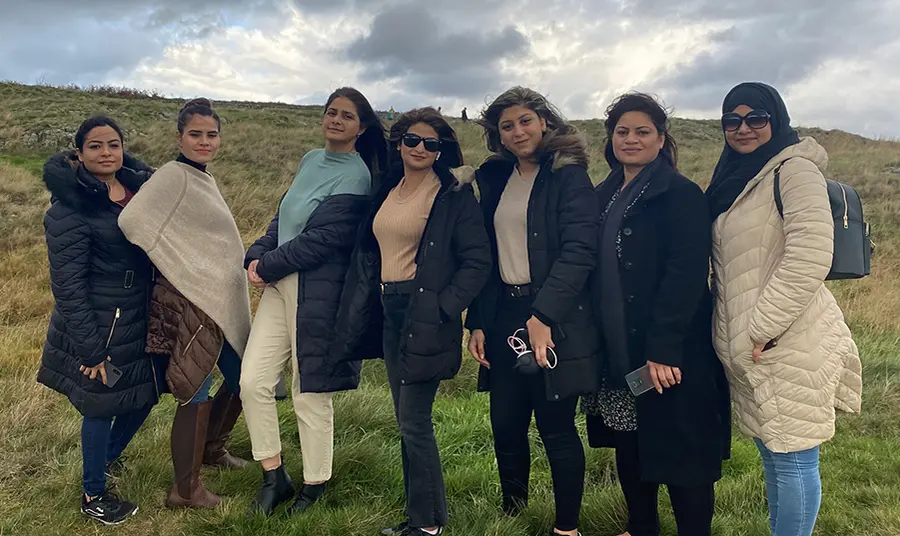
Our Heritage
The project
The Wayfinding project launched in January 2019 and was completed in December 2021. The project had to be adapted to deal with the restrictions of the coronavirus (COVID-19) pandemic.
During that time it produced:
- the Earth Sea Love podcast, now in its fourth series
- the SHEROES, a weekend programme for a group of Muslim girls aged 8-15 from inner city Newcastle to learn about wildlife and nature
- a Black women’s walking group
- support for six women to achieve a Level 3 Qualification in Lowland Expedition Leadership through the Black Women’s Leadership Programme
- three 'Grand Days Out’ to the seaside for groups of women and children
The organisation
The project was run by community organisation identity on tyne, which specialises in working with under-served communities including refugees, asylum seekers and women.
Identity on tyne worked with the Angelou Centre in Newcastle, North East Guides, Wild North Discovery and Durham Wildlife Trust to deliver the project.
The funding
The project was awarded a grant of £54,900.
It’s been such a joy and privilege to work with the SHEROES and to witness the girls grow in confidence through the weeks.
Mandy, Ranger, Durham Wildlife Trust
Ethnically diverse communities are poorly represented in both audiences and the workforce in the natural heritage sector. The funding was used to provide training and resources that would encourage women and girls from these communities in the North East of England to connect with nature.
Thanks to the Wayfinding project, many of the participants were able to do this for the first time.
The results
Meeting our outcomes
The project met three of our outcomes strongly.
A wider range of people will be involved in heritage
This project was successful at meeting our mandatory outcome 'A wider range of people will be involved in heritage' by:
- opening up natural heritage to people from ethnically diverse communities
- exploring and sharing natural heritage with participants, many of which were new experiences for them
- creating 44 episodes of the Earth Sea Love podcast which shared stories about people from underserved communities' often-overlooked relationships with nature. It has had so far nearly 4,000 individual downloads
People will have greater wellbeing
The Wayfinding project took place during the coronavirus pandemic when many people were subject to restrictions and lockdowns. It was identified that getting out and about in nature was vital to mental wellbeing and physical health and this was achieved through activities such as walking groups and days out to the seaside. These trips allowed participants to connect with nature and also with each other.
People will have developed skills
Through the SHEROES programme, a group of Muslim girls were trained in species identification and habitat care, led by Durham Wildlife Trust. Each weekend session focused on a different aspect of nature from trees and flowers, to bees, bugs, butterflies and birds.
The Black Women’s Leadership Programme saw six Black women successfully achieve their Level 3 Qualification in Lowland Expedition Leadership (LEL3). This qualification means that they can now independently lead safe, purposeful and enjoyable walks in lowland countryside and train participants to undertake their own walks.
I didn’t think I was going to make that final walk, navigating across the moors, in the fog and rain and cold. But I did it at my own pace and kept saying to myself that I can do this. I’m doing what I enjoy, being outside with nature and I’m doing it.
Natalie, participant in the Black Women’s Leadership Programme
The group have since put their newfound skills into use. During the later stages of the project they have led a number of their own walks with small groups of women and children.
The future
Through the activities and resources of the Wayfinding Project, identity on tyne has been recognised by a number of organisations, charities and outdoors groups.
As project coordinator, Dr Sheree Mack was involved into the CPRE Access to Nature Peer Research Project which fed into the charity’s ‘Countryside for All’ initiative. Through this involvement Dr Mack presented the work identity on tyne was doing to the Secretary of State for Environment, Food and Rural Affairs, George Eustice MP. This has opened up a conversation with the Department for Environment Food & Rural Affairs about how to create safer and more enjoyable access to the British countryside for diverse audiences.
Other members of identity on tyne have been invited to act as advisers on issues relating to diversity and nature with Northumberland National Park and Durham Wildlife Trust.
Identity on tyne are planning on continuing the conversations they have started in order to make the countryside welcome and open to all.